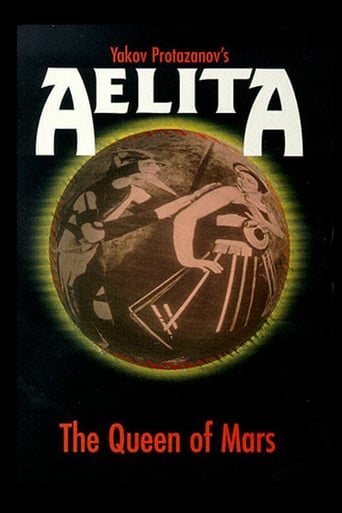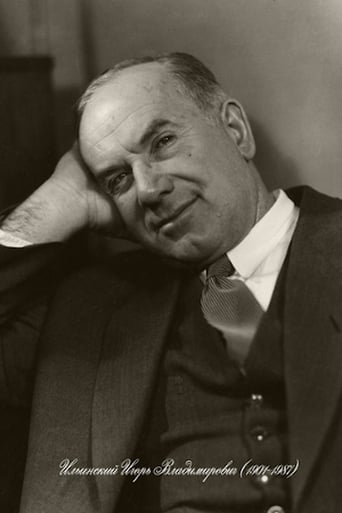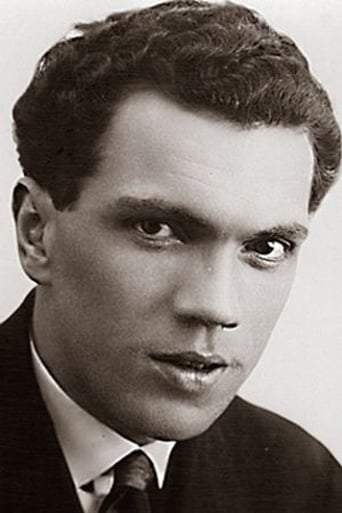Linbeymusol
Wonderful character development!
Inclubabu
Plot so thin, it passes unnoticed.
Stephanie
There is, somehow, an interesting story here, as well as some good acting. There are also some good scenes
pontifikator
Yakov ProtazanovDirected by Yakov Protazanov, who led an interesting life, when interesting lives meant death. Protazanov directed many films from 1911 through 1918, and was acclaimed by many as a genius. Some background in Soviet history helps set the scene for "Aelita." It was in a series of revolts in 1917 that the Tsars were overthrown and replaced by a provisional government. The Tsarist army had suffered setbacks and losses in World War I, and it was not capable of supporting the Tsar. The Tsar was deposed in February of 1917. (Or March. The tsars used the Gregorian calendar, and the soviets used the Julian calendar.)The October Revolution is usually dated to have occurred on October 25, 1917, a date you will see emblazoned in fire during the screening of "Aelita." The October Revolution overthrew the Russian Provisional Government which was set in place following the February Revolution. (The western world may know the October Revolution as the Bolshevik Revolution.) During the years from about 1918 through 1922, there was continual combat in the country as the White Russian army fought the Bolsheviks for power and control of the country. This is referred to as the Russian Civil War, and it led to the formation of the Soviet Union.It was during the period of the Russian Civil War that Protazanov was exiled or self-exiled, depending on who tells the tale, in Europe. He was persuaded to return to the new Union of Soviet Socialist Republics in 1923, and he directed "Aelita: Queen of Mars" which is probably the first soviet movie and may be the first soviet science fiction film as well. "Aelita" is a propaganda film, as all good soviet films are. However, it shows us life in the Soviet Union rather starkly, and it recounts life there as a struggle not only to survive but to be good communists as well. I'm somewhat surprised at the reality of life shown: abject poverty, horrible crowding and population dislocation, state control of who lives in your house (even in what rooms), rationing, and the like. I think part of the purpose of "Aelita" is to warn state bureaucrats not to turn to corruption, as a corrupt official is shown being investigated for his crimes.I would say the foundation of "Aelita" is showing the daily lives of regular people after the Russian Civil War as they try to rebuild the country into the Soviet Union, as seen by Lenin and the Communist Party. One of the regular people is named Los or Loss, depending on the translation of Лось, who is an engineer. Los daydreams of space travel, and his co-workers put up with him good-naturedly. A radio broadcast is received throughout the world with a cryptic message, and Los foolishly believes it's a transmission from Mars. He fantasizes about building a rocket ship and going to Mars, and he fantasizes what Martians are like. Meanwhile, back on earth, his wife works at what is referred to as a check point, processing travelers who are going from nowhere to another nowhere on crowded trains at crowded stations. A party bureaucrat is put into the home where Los and his wife live. The bureaucrat sweet talks Mrs. Los, and the engineer gets jealous. His fantasies of Mars include fantastic sets and fantastic costumes, with an attractive Queen of Mars who wears a fantasy top which seems to support three breasts. In his fantasy, the queen can see earth and in fact sees him and is intrigued. However, although she reigns, she does not rule, and she is ordered to stop spying on earth. After many, many twists and turns of plot, our hero finally takes off from earth and lands on Mars, where he leads a revolution.One of the faults of "Aelita" is its many subplots, and they take up a significant amount of time, leading to a movie that nears two hours in length. The Martian fantasies take up a very small portion of the movie, so I'm not willing to call it truly a sci-fi movie, but the alien life is certainly a major plot point. The thrust of "Aelita" is that the soviet life-style is best on earth and off and that we should stop our daydreaming and get some real work done. The Martian segments are metaphorically about life under the tsars with literal throwing off of chains and escape from serfdom.The propaganda is there, but it's not heavy handed. The movie is too long, too convoluted with subplots, but it remains interesting as a picture of life after the Russian Civil War. Nikolai Tsereteli is Los, Yuliya Solntseva plays the queen of his dreams, and Valentina Kuindzhi plays Natasha Los, his wife in the all too real world of 1924 Soviet Union. As an aside, although the movie took place over the course of a year, the city where the action occurred remained bitterly cold and snow-covered through out the movie. The Martian sets and costumes get some kidding today, so you may find it worthwhile to watch and compare to "Metropolis," "Buck Rogers" (the Buster Crabbe version), and maybe "The Cabinet of Dr. Caligari."
MartinHafer
This is a review of the Kino DVD version of AELITA. The DVD is a mixed bag. On one hand, there are absolutely no special features--none. I would have loved to have seen some old soviet propaganda shorts or a cartoon or something! On the other hand, the print is absolutely fabulous--pristine, though the film does run a bit under-speed. In other words, silent films ran from 16 to 22 frames per second--well under the sound standard of 24 fps. So, silent films need to have their speed compensated for a bit or the movie runs too fast. However, Kino appeared to compensate a bit too much--making the film run at a slightly sluggish pace.Apparently this is one of the earliest sci-fi films--debuting three years before METROPOLIS but 21 years after Georges Méliès' VOYAGE TO THE MOON (and very little, if any, in between). As far as the sci-fi aspects of the film, they are pretty exciting to watch. The bizarre costumes for the Martian segments are rather reminiscent of the German Expressionist movement seen in such films as THE CABINET OF DR. CALIGARI and METROPOLIS, though in a more subdued manner. This is because the film was made only a few years after the Russian Revolution and they were frankly too poor to afford the fancy sets and all the extras of more expensive German productions. It shows, but wasn't a major problem.A serious difficulty with this film that has prevented it from being remembered like METROPOLIS is that the film's sci-fi elements really are secondary. In other words, Soviet propaganda is THE reason for the film and this makes viewing a real chore for the average viewer, though historically hearing all the pro-Communist rhetoric is interesting. Just be forewarned that its message is very heavy-handed and pervades the film.The bulk of the film concerns Soviet citizens living in a home that has been subdivided into flats by the State. One couple consists of a good Soviet who believes in the revolution. He's a scientist and is dedicating his life to building a rocket to take him to Mars--it seems the planet has been sending cryptic messages to Earth and he wants to investigate. The other couple consists of an evil profiteer and his wife. While he has a job working for the State, he does it less out of a love for Mother Russia and more so he can pad his pockets. This is a very, very obvious slam at the White Russians and Socialists who the Communist government had just finished liquidating (i.e., killing) in order to "purify" the nation and purge counter-revolutionary thinking.Unfortunately, these Soviets occupy so much of the film that little time is allowed for the Martians or the space flight. This really hinders the film as it's such obvious propaganda and very preachy as well.As for Mars, Aelita is the queen of the planet, but she really has no power. Instead, a few jerks run the planet and enslave the masses. It's an obvious parallel to Czarist Russia--no subtlety here. In fact, when the humans do come to Mars, they spend their time fomenting revolution--turning the Martian proletariat into good Communists. Eventually, the revolution appears to triumph and they announce a Martian Soviet Socialist Republic!! There's a lot more to it than this, but I won't say more because it would probably ruin the film.So why, if the film is so flawed, do I still give the film a 7? Well, it isn't because of all the propaganda and 75% of the film. It's because the other 25% are so fascinating and innovative that it's all very worthwhile. A very interesting film from a historical point of view, but its continual pro-Communist message is so unsubtle that it keeps the film from earning a higher score. This is ironic considering that much of the same pro-proletariat and anti-bourgeoisie message is also in METROPOLIS but because it's presented with some degree of subtlety, it's an infinitely more satisfying film.Overall, from a political and historical point of view, it's worth seeing. But, for the average viewer out there, the film's creaky structure and blatant messages probably make it too tough to watch and enjoy. For the average viewer, it's just not worth a look--at least until you've seen other silent films and have learned to appreciate the genre--even the slower and less sophisticated films.
JoeB131
This film is strange, even for a silent movie. Essentially, it follows the adventures about a engineer in post-revolutionary Russia who daydreams about going to Mars. In this movie, it seems like the producers KNOW the Communists have truly screwed up the country, but also seems to want to make it look like they've accomplished something good.Then we get to the "Martian" scenes, where everyone on Mars wears goofy hats. They have a revolution after being inspired by the Earth Men, but are quickly betrayed by the Queen who sides with them. Except it's all a dream, or is it. (And given that the Russian Revolution eventually lead to the Stalin dictatorship, it makes you wonder if it was all allegory.) Now, I've seen GOOD Russian cinema. For instance, Eisenstein's Battleship Potemkin is a good movie. This is just, well, silly.
alexmatte
A remarkable film from 1924, of immense historical interest. See the turbulence of Russia as it was just a few years after the 1917 revolution and the subsequent war 1918-21 against the foreign-backed White Army. But see it all in the context of a most amazing futurist film, at least the equal of the other two equivalent futurist greats from Germany and Britain - Metropolis (1927) and High Treason (1928), respectively. Arguably it is the best of the three, with avant garde sets and costumes that could have come straight out of the Bauhaus' choreography workshop. The version shown on Australian TV had a presumably later added music score that was just so perfect and integrated to the film's plot and visuals that it could not possibly have been better had it been original. It had a mesmerising robotic, minimalist, mechanical and repetitive character that was simply made for a futurist and surreal film like this. The cyrillic characters of the silent narration only add (for us Westerners, at least) to the mystery and surreality of the whole story, and one can only feel sorry for those who, after all this tour-de-force, feel shortchanged from an unfulfilled need for a more banal storyline. Or aggrieved by the perception of the film as mere propaganda. There's always reruns of Rambo and The Green Berets for you, fellers! It's a pity most cinephiles are oblivious to the existence of this film, as wider availability and screening would ensure its fame as one of the greatest silent, futurist and early modern films.








